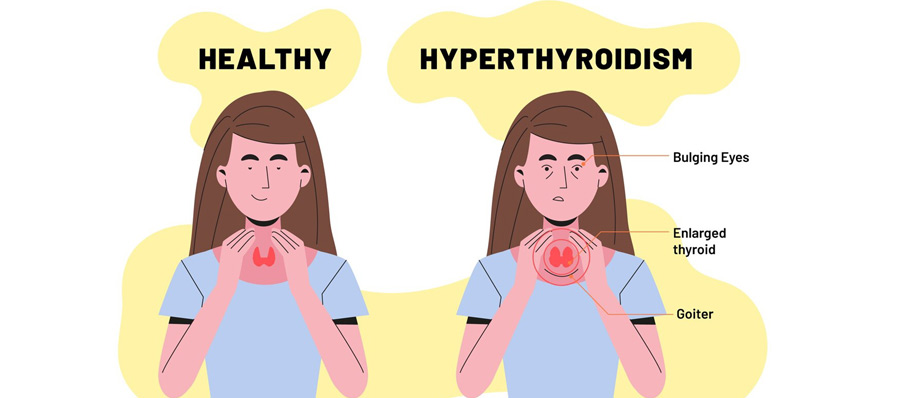Over production of hormones by the thyroid gland located at the front of neck. It causes rapid heartbeat, sudden weight loss, tremor, difficulty sleeping and changes in menstrual cycle.
Causes: The causes of hyperthyroidism are Graves' disease, toxic adenoma, Plummer's disease and thyroiditis.
Symptoms: Symptoms include fatigue and increased heart rate.
Diagnosis: The doctor will first take a complete medical history, followed by physical examination, including blood pressure and heartbeat checks
Facts
Treatable by a medical professional
Diagnosed by medical professional
Often requires lab test or imaging
Can last several years or be lifelong
Common for ages 50 and older
More common in females
Family history may increase likelihood
Urgent medical attention recommended in severe cases
Know More
Thyroid is a small hormone-producing gland located at the front of neck, which produces and secretes two hormones - tetraiodothyronine (T4) and triiodothyronine (T3). Hyperthyroidism results in overproduction of either one or both the hormones.
Symptoms
- CHARACTERISTIC
- COMMON
- Swollen thyroid gland
- Prominent eyes
- Increased metabolic rate, a condition termed as hyper metabolic state
- Irregular or rapid heartbeat
- Increased blood pressure
- Shaking hands
- Increased sweating
- Hot flashes
- Irritability and restlessness
- Increased bowel movement
- Weight loss
- Weakness
- Difficulty sleeping
- Brittle hair
- Hair loss
- Nausea and/or vomiting
- Irregular menstrual cycles or amenorrhea in women
- Breast development in men
Causes
- COMMON
Factors that influence the overproduction of hormones include:
- Graves’ disease, an autoimmune disease
- Excessive intake of iodine through diet, dietary supplements or medications
- Tumor or infection of the thyroid gland
- Tumour or infection of the thyroid gland
- Certain tumors of the ovaries, testes, or pituitary gland
- Gender: Women are more prone to develop hyperthyroidism than men
- Family history
- Chronic diseases such as type 1 diabetes, pernicious anemia and primary adrenal insufficiency
Diagnosis
- COMMON
- Complete blood count (CBC)
- Thyroid scan
- Thyroid uptake test
Treatments
Treatments for hyperthyroidism primarily include reducing the production of hormones from the gland. Medications may be prescribed to control some of the symptoms.
Complications
If untreated for a prolonged period it may lead to
- Thyroid storm is the release of large amounts of thyroid hormone and sudden worsening of symptoms
- Loss of consciousness
- Shortness of breath
- Very fast or highly irregular heartbeat
- Atrial fibrillation, a condition with irregularly beating heart, in turn increasing the risk of stroke
- Osteoporosis or thin and weakened bones
- Eye problems, which can lead to vision loss
Prevention
- Eat healthy and nutritious diet with necessary amounts of iodine, calcium, and sodium
- Take only prescribed nutritional supplements
- Exercise regularly
- Learn relaxation techniques such as yoga and deep breathing
- Avoid smoking and alcohol
Nutrition
- FOODS TO EAT
- FOODS TO AVOID
- Foods with antioxidants: e.g. berries such as strawberries, blueberries
- Cruciferous vegetables: e.g. broccoli, cauliflower, kale, cabbage
- Vitamin D rich Foods: e.g. fish, egg, mushroom
- Omega-3 fatty acid containing foods: e.g. walnut, olive oil, flaxseed
- Calcium-rich Foods: e.g. milk, cheese
- Suspected food allergens such as dairy products, wheat gluten, soy, corn and artificial food additives
- High-glycemic carbs such as white flour, sugary sweets, juices, low-fiber cereals, rice cakes and instant potatoes
- Unhealthy fats such as red, fried and processed meats, crackers, cookies, cakes, pastries and french fries
- Alcohol and caffeine
Source : www.msn.com
Also Read : Top 7 Gyms In Thane For Your Fitness Goals



Contact Us